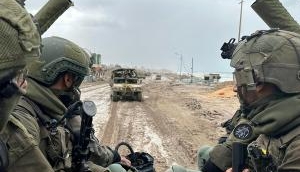What Qamar Bajwa's appointment as army chief means for Pak and India

The suspense, the speculation and the rumours are finally over. After months of intense debate about who would replace the outgoing Army Chief General Raheel Sharif, Lt Gen. Qamar Javed Bajwa has been appointed as the 16th army chief of Pakistan.
While the senior-most officer, Lt Gen Zubair Hayat has been appointed as Chairman Joint Chief of Staff Committee (CJCSC), true to form, PM Nawaz Sharif, has not stuck with the seniority principle for the army chief.
Gen Bajwa was the junior-most in the short-list of four Lt Generals who were being considered. Gen Raheel Sharif too was not the senior most when Nawaz appointed him as Army Chief in November 2013.
Lt Gen Qamar Javed Bajwa is from the 62nd PMA Long Course and belongs to the Baloch Regiment. He would be the fourth Army Chief from this regiment. Other who preceded him were Gen Yahya Khan, Gen Aslam Beg and Gen Ashfaq Kayani. Of course, none of them were ethnic Baloch.
Gen Bajwa is currently serving as Inspector General of the Training and Evaluation in the GHQ, a post that Gen Raheel Sharif held before being promoted as Army Chief.
Others in contention for the post of army chief were Multan Corps Commander Lt Gen Ishfaq Nadeem and Bahawalpur Corps Commander Lt Gen Javed Iqbal Ramday.
The significance
Given the current tensions with India on the Line of Control (LoC), Gen Bajwa's appointment is significant. Among all the contenders, Gen Bajwa has probably had the most field experience of Kashmir. He had served in X Corps, the Pakistan army's biggest corps which is responsible for the area along the LoC as Lt. Colonel when he was GSO, as Brigadier when he was chief of staff, as Major General when he commanded the Force Command Northern Areas (FCNA) and finally as Corps Commander.
Three interesting things about Gen Bajwa need to be noted.
First, In the run up to the appointment of the new army chief, a controversy was generated to disqualify Lt Gen Bajwa on the grounds that one his distant relatives was an Ahmadi and he too could well be one. This campaign was led by a senator, Professor Sajid Mir, of the Jamiat Ahl-e-Hadith, Pakistan who warned that he would lead the country to doom. In the event it turned out that Bajwa himself was not an Ahmadi.
Second, Gen Bajwa has served with a UN mission in Congo as a brigade commander alongside former Indian army chief Gen Bikram Singh, who was also there as a division commander.
Third, despite his extensive experience in Kashmir and Gilgit-Baltistan, Gen Bajwa is said to consider religious extremism a bigger threat for the country than India.
For Nawaz Sharif, Gen Bajwa clearly ticked all the boxes. He would be in a position to handle the heightened tensions on the LoC, given his extensive experience there. This could work both ways - escalation or reduction of tensions. At the same time, his views on domestic extremism being the priority rather than India could also suit Sharif's business interests of trade with India rather than prolonged tensions.
However, Nawaz would have to reckon with the institutional interests of the Army. So far the consensus has been to treat India as the enemy. Even when, under Gen Kayani, internal terrorism was identified as the number one security threat, there was no let up as far as hostility towards India was concerned.
What could in due course restore a semblance of sanity on the LoC would be the preoccupation of Gen Bajwa to try and fill big shoes that Gen Raheel Sharif is leaving behind.
Three main elements of Gen Sharif's legacy are: initiating Operation Zarb-i-Azb in North Waziristan against the Tehreek-i-Taliban Pakistan in June 2014, something that his predecessor, Gen Kayani had shied away from doing; the operation in Karachi that reduced the level of violence in the city and broke the stranglehold of the MQM; being supportive of the civil government despite palpable tensions between it and the military.
On several occasions Gen Sharif could have jettisoned the civil government but did not succumb to the temptation. Instead he chose to exercise control through the mechanism of 'Apex Committees', both at the centre and in the provinces. Labelled a 'soft coup', Gen Sharif ensured that the Army's point of view was well represented where it mattered.
Gen Bajwa would have to move quickly to consolidate the gains of the operations in north Waziristan and Karachi. Both these operations have been unraveling in the past few months. Terrorists of different hues have carried out deadly attacks in Quetta, Peshawar, Mardan, Mohmand and Shikarpur while targeted and sectarian killings have re-appeared in Karachi.
Civil-military relations
Gen Bajwa's relations with the civil government would have to cross a huge hurdle in the form of the Dawn leak or what is being called Newsgate - the leak from the PM's house that painted the army in a poor light.
After the Corps Commanders dubbed the leak as a security breech for the government to push it under the carpet is seen as a big setback for the army. This is one big blot that Gen Raheel will carry into retirement.
It will be up to Gen Bajwa to redeem the Army's prestige by ensuring that some demonstrable action is taken against those responsible for the leak. Without this, he will be seen in the army and in the country as having bartered the army's honour for the sake of his own promotion by making a deal with Nawaz Sharif.
Finally, Gen Bajwa will have to contend with the unprecedented popularity that Gen Raheel enjoyed among the general public and on social media as a result of his leading from the front. Such is the governance deficit in Pakistan that the general public has come to believe that the Army Chief's charter of duties includes toppling unpopular and corrupt elected governments.
It remains to be seen whether Gen Bajwa will fall to such temptations like some of his predecessors did or resist them like Gen Raheel. Given Nawaz Sharif's past record of alienating army chiefs as well as the controversies he is surrounded with, including the Panama papers case being heard in the Supreme Court, such an opportunity won't be long in coming.
First published: 27 November 2016, 7:57 IST





![BJP's Kapil Mishra recreates Shankar Mahadevan’s ‘Breathless’ song to highlight Delhi pollution [WATCH] BJP's Kapil Mishra recreates Shankar Mahadevan’s ‘Breathless’ song to highlight Delhi pollution [WATCH]](https://images.catchnews.com/upload/2022/11/03/kapil-mishra_240884_300x172.png)

![Anupam Kher shares pictures of his toned body on 67th birthday [MUST SEE] Anupam Kher shares pictures of his toned body on 67th birthday [MUST SEE]](https://images.catchnews.com/upload/2022/03/07/Anupam_kher_231145_300x172.jpg)






